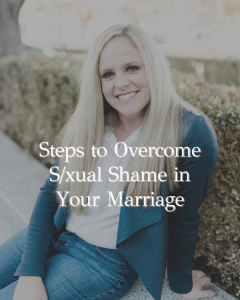
In this episode, we are going to address a topic that so many struggle with but often don’t talk about: sexual shame. Many carry the burden of sexual shame and it can impact our view of ourselves and our connection with our spouse. If you’ve ever found yourself feeling like something is wrong with you for having sexual thoughts, or if you’ve hidden aspects of your sexuality out of fear or guilt, this episode is for you.
Show Summary:
Let’s start this episode by addressing a topic that so many struggle with but often don’t talk about: sexual shame. Shame around sexuality is a burden many carry, and it can significantly impact not only how we view ourselves but also how we connect with our spouse. If you’ve ever found yourself feeling like something is wrong with you for having sexual thoughts, or if you’ve hidden aspects of your sexuality out of fear or guilt, this episode is for you.
Why Do We Have Sexual Shame?
Sexual shame is rooted in cultural, religious, and societal messaging that tells us our sexuality is something to be feared, controlled, or even hidden. These messages are often internalized early in life and reinforced over time, creating a deep-seated belief that there’s something inherently wrong with our sexual nature.
So tell me if you’ve ever heard any of these ideas: “good girls don’t talk about sex,” or “boys only want one thing” or “our genitals are gross” or “we need to be modest to help boys control their thoughts” or “we need to be careful with our sexuality so we don’t harm someone” or “sex is the sin next to murder” or “we must protect our virtue to be worthy of God’s love.” These seemingly innocent phrases plant seeds of shame, suggesting that sex is something dangerous or morally wrong. Over time, these beliefs can lead to confusion and guilt when we start to feel natural sexual urges or desires. The result is an internal conflict: on one hand, we feel curious and attracted to others, and on the other hand, we’ve been told that those feelings are inappropriate or sinful.
Religious teachings can also play a significant role. Many faith traditions emphasize sexual purity, which can create the idea that sex is only acceptable under very specific conditions—typically within marriage—and even then, with limitations. If someone deviates from these rules, they may experience overwhelming guilt and feel they’ve lost their worthiness or spiritual standing and they can’t come back from it.
Example: A woman raised in a conservative religious environment might be taught that premarital sex is sinful. If she engages in sexual activity before marriage, she could carry that shame into her relationship, even after marrying, believing she’s “ruined” or unworthy of a healthy sexual relationship. This mindset might prevent her from fully enjoying sex with her spouse or from discussing her sexual desires openly.
How Does Sexual Shame Show Up?
Shame doesn’t look the same for everyone, but there are common ways it manifests. Let’s explore a few:
- “Something is wrong with me because of my sexual thoughts and feelings”
This is a classic example of internalized shame. Someone might feel guilty just for experiencing sexual desire. They might think, “If I’m thinking about sex, does that make me a bad person? Am I perverted for feeling this way?” This type of thinking can make it difficult to enjoy sexual experiences without guilt or anxiety.
Example: A man who experiences spontaneous sexual fantasies might believe these thoughts are sinful, leading him to suppress his desires or avoid intimacy with his spouse out of fear that these thoughts make him impure or deviant. - “Something is wrong with my body”
Body shame is another layer of sexual shame. If we’re taught that certain body parts are “private” or “shameful,” it can be hard to feel confident during sex. Negative body image also plays into this—believing we’re not attractive enough can lead us to feel undeserving of sexual pleasure.
Example: A woman might feel insecure about her post-pregnancy body, thinking that she’s no longer attractive to her husband. This insecurity leads her to avoid sexual intimacy, covering her body during sex or refusing to let her partner see her fully. - “My sexuality should be kept hidden”
Many people feel they must hide their sexual desires, believing that openly expressing or even acknowledging them is wrong. They might avoid discussing sex with their spouse, never initiate intimacy, or feel shame for wanting sex more than they believe they should.
Example: A husband may avoid initiating sex with his wife because he fears being labeled “too sexual” or “needy,” assuming that his desire for frequent intimacy is abnormal. - “God will not love me or bless me if I am sexual or enjoy my sexuality”
This belief can create a significant emotional and spiritual burden. The idea that God disapproves of sexual enjoyment can cause deep conflict for someone who wants to honor their faith while also enjoying sexual pleasure.
Example: A woman might feel conflicted about enjoying sex with her husband, fearing that her desire for sex could somehow distance her from God. This could cause her to hold back emotionally and physically, even in a committed, loving relationship. - “Talking about sexuality is wrong and should be kept private”
When we’re taught that talking about sex is taboo, it makes it difficult to seek help, express concerns, or share desires. This lack of communication leads to misunderstandings and unmet needs within the marriage.
Example: A couple might avoid discussing their sexual needs for years because they were both raised to believe that such conversations are inappropriate. As a result, their sexual relationship becomes stagnant or dissatisfying, but they don’t know how to fix it because they’ve never learned how to communicate openly about sex.
How Does Shame Affect Our Sexuality?
Shame disrupts the natural flow of sexuality, creating barriers between our desires and our ability to express them. If we feel shame around our sexual thoughts, we might suppress them, causing us to disconnect from our bodies. If we feel ashamed of our bodies, we might shy away from physical intimacy altogether. When shame is present, it becomes hard to relax and be fully present during sex, which impacts both our pleasure and our connection with our partner.
Example: A woman who grew up being told that “good girls don’t enjoy sex” might find herself unable to fully engage during intimacy. She might feel like she’s constantly holding back, worried that enjoying sex too much could make her “bad” in some way.
How Does Shame Affect Our Marriages?
Sexual shame can drive a wedge between partners, creating distance and tension. When we feel ashamed, we tend to shut down emotionally and physically. Instead of reaching out to our spouse for connection, we may withdraw to protect ourselves from the discomfort of vulnerability.
Shame also hinders communication. If one partner is too ashamed to talk about their sexual needs, desires, or insecurities, the other partner may feel confused, rejected, or even resentful. Over time, this lack of communication can lead to frustration, dissatisfaction, and a breakdown in intimacy.
Example: A husband who struggles with erectile dysfunction might feel intense shame about his condition. Instead of discussing it with his wife and seeking solutions together, he avoids sex altogether, leaving his wife feeling unwanted and disconnected. This creates a cycle of distance and resentment, all rooted in shame.
How Do We Hide From Our Sexuality?
Shame makes us hide, both from ourselves and from others. Here are some common ways people hide from their sexuality:
- Minimizing desires: We might convince ourselves that we don’t really want sex or that our desires are not important. This can lead to sexual avoidance or pretending we’re “fine” with a lack of intimacy.
- Avoiding intimacy: Some people shut down sexually, avoiding touch or affection for fear that it will lead to feelings of inadequacy or shame.
- Detaching emotionally: In some cases, people may go through the motions of sex but remain emotionally disconnected, treating sex as a task rather than a source of pleasure or connection.
Brené Brown’s shame shields are helpful in understanding how we respond to shame:
- Moving away – We retreat and withdraw, which may look like avoiding sexual intimacy or emotionally shutting down.
Example: A man might refuse to talk about his sexual insecurities, shutting down conversations about intimacy entirely. Over time, this leads to a growing distance between him and his spouse. - Moving toward – We try to please others to avoid shame. In sexual relationships, this could mean having sex to keep a partner happy, even if we don’t want to or don’t enjoy it.
Example: A woman might engage in sex more often than she wants to because she feels pressure to please her husband, rather than because she desires it. This reinforces the idea that her needs don’t matter. - Moving against – We fight back against the shame by becoming defensive or critical. In terms of sexuality, this can manifest as anger, blame, or avoidance when faced with sexual difficulties.
Example: A husband who feels insecure about his sexual performance might lash out at his wife, blaming her for their lack of intimacy, rather than confronting his own feelings of shame.
The Antidote to Sexual Shame
The antidote to shame is vulnerability, connection, and self-compassion. But how do we actually practice this? Different modalities offer tools for healing sexual shame:
- Thought Work
Thought work, or cognitive behavioral approaches, helps you identify and challenge the beliefs that fuel your shame. If you think “I’m bad for wanting sex,” thought work can help you recognize that this is just a belief, not a fact, and work to replace it with healthier thoughts, like “It’s okay to desire sex.” This is a lot of what we do in coaching. - Somatic Work
Somatic work focuses on reconnecting with the body. Sexual shame often causes us to disconnect from our physical selves, so practices like body awareness, breathwork, and mindful touch can help us rebuild that connection. Something I do with my clients is help them release the shame they feel in their bodies that keeps them from feeling pleasure and reaching orgasm. This can be a really powerful process and by feeling more present in their bodies, they can begin to let go of the shame that’s stored there. - Trauma Therapy
For those whose sexual shame is rooted in trauma, specialized therapies like EMDR (Eye Movement Desensitization and Reprocessing) can help process and heal those traumatic memories. Trauma therapy allows individuals to release the emotional charge from past experiences and move toward a healthier, shame-free relationship with their sexuality.
But there are also some things you can do alone.
- Recognizing where shame shows up in your thoughts, feelings, and behaviors.
- Challenging those beliefs by seeking out new perspectives. Understand that your sexuality is a natural, healthy part of who you are. It’s okay to feel desire, to enjoy sex, and to communicate your needs.
- Practicing vulnerability with your spouse. Open up about your feelings around sex and shame. Talk about your fears, your desires, and your experiences. When you bring your shame into the light, it loses its power.
- Building self-compassion by recognizing that you are worthy of love and connection, just as you are. Brené Brown talks about embracing imperfection and being kind to ourselves. Start giving yourself the grace to make mistakes, to learn, and to grow in your sexual self.
How Overcoming Sexual Shame Can Bless Your Marriage
When we free ourselves from shame, we open the door to deeper intimacy, both emotionally and physically. Without shame, you can be more honest and open with your spouse about your desires, needs, and insecurities. This vulnerability fosters trust, which is the foundation of a healthy sexual relationship.
Overcoming sexual shame also allows you to enjoy sex more fully. When you stop viewing sex as something shameful, you can embrace it as a source of pleasure, connection, and joy in your marriage. You’ll feel more confident in expressing your desires and more open to exploring new experiences with your spouse.
Example: A couple who has struggled with sexual shame for years might, through therapy or coaching, learn to talk openly about their sexual needs for the first time. As they start to let go of their shame, they experience a new level of closeness, trust, and satisfaction in their relationship.
Sexual shame can feel overwhelming, but it’s not something you have to carry forever. By practicing thought work, somatic work, or trauma therapy, you can begin to release the shame and embrace a healthier, more fulfilling sexual identity. And as you do, you’ll not only experience personal healing but also transform the intimacy in your marriage.
Remember, love is a journey, not a destination. Stay committed, stay passionate, and stay connected. Goodbye for now.



